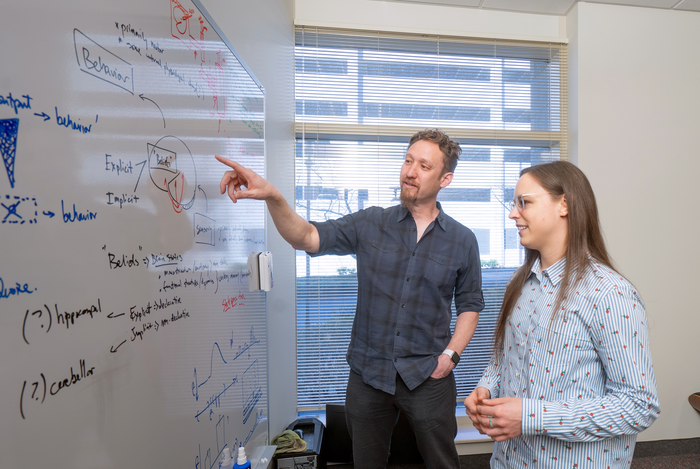WINSTON-SALEM, N.C. – Feb. 7, 2023 – Dopamine is a neurotransmitter that’s made in the brain and acts as a chemical messenger, communicating between nerve cells in the brain and the rest of the body. Dopamine can impact how people think and feel. While it’s most often associated with being a “feel-good” hormone, its role in functions such as movement, cognition and learning is an area of current research. Researchers are also working to better understand the impact that substance abuse or addiction disorders have on dopamine levels and behavior.

Credit: Wake Forest University School of Medicine
WINSTON-SALEM, N.C. – Feb. 7, 2023 – Dopamine is a neurotransmitter that’s made in the brain and acts as a chemical messenger, communicating between nerve cells in the brain and the rest of the body. Dopamine can impact how people think and feel. While it’s most often associated with being a “feel-good” hormone, its role in functions such as movement, cognition and learning is an area of current research. Researchers are also working to better understand the impact that substance abuse or addiction disorders have on dopamine levels and behavior.
In a new study from Wake Forest University School of Medicine, scientists have demonstrated that the connection between dopamine and counterfactual information, which is related to the psychological notions of regret and relief, appears altered by alcohol use disorder.
The findings appear in the February issue of the Journal of Neurosurgery.
Kenneth T. Kishida, Ph.D., associate professor of physiology and pharmacology and neurosurgery at Wake Forest University School of Medicine, studies neurotransmitters and their role in human behavior and decision-making. Using fast scan cyclic voltammetry, an electrochemical technique, Kishida’s team can detect and measure serotonin and dopamine in real-time. Taking these measurements is very challenging and can only be done during invasive procedures such as deep-brain stimulation (DBS) brain surgery, which is commonly used to treat conditions such as epilepsy, Parkinson’s disease, essential tremor and obsessive-compulsive disorder.
For this study, Kishida’s team collaborated with neurosurgeons Stephen B. Tatter, M.D., and Adrian W. Laxton, M.D., to insert a carbon fiber microelectrode deep into the brain of four participants at Atrium Health Wake Forest Baptist Medical Center who were scheduled to receive DBS to treat their movement disorders. Two of the participants had a history of alcohol use disorder, and two did not.
While the participants were awake in the operating room, they played a simple computer game. As they played the game, dopamine measurements were taken in the striatum, the part of the brain that controls cognition, reward and coordinated movements.
“We measured dopamine once every 100 milliseconds during a sequence of fairly simple decisions,” Kishida said.
The game involved a series of choices between sure bets or 50%-chance gambles for small amounts of money. Each task involved one simple decision. On one side of the screen, the patient saw one number, a “sure bet.” If the study participant selected the sure bet, they would “win” that amount. On the other side of the screen, the participant saw two numbers, which were separated by a line. This was the gamble outcome, and the participant would “win” either of the two numbers with an equal 50% chance.
“Sometimes taking the gamble was technically the better outcome, but sometimes, it wasn’t,” Kishida said. “We were able to assess how the participants made choices and what dopamine was doing as they did so.”
The research team found distinct differences in how the brain releases dopamine based on participants’ alcohol use disorder history. Dopamine levels in participants with alcohol use disorder, following game outcomes associated with relief, were lower than in patients without alcohol use disorder.
“We’ve shown before that dopamine levels in humans seems to track information related to regret and relief,” Kishida said. Previous research suggests that learning from regret is impaired in patients with alcohol use disorder.
“In our study, dopamine measurements, at these really fast timescales, appear altered in patients with a history of alcohol use disorder. When their choice was the best it could have been, we see dopamine levels falling when we expected it to increase like we observed in patients without alcohol use disorder,” Kishida said.
Kishida acknowledged that a major limitation of the study is the limited sample size.
“Much more work is needed,” Kishida said. “However, to my knowledge, these represent the first investigations of dopamine signals on sub-second timescales in humans with alcohol use disorder.”
Kishida said larger studies are needed to gain more insight on these fast chemical fluctuations in the human brain, what they mean for decision-making processes and whether they are altered in humans with addiction disorders.
This study was supported by grants from the National Institutes of Health: R01DA048096, P50DA006634, R01MH121099, R01MH124115, KL2TR001420, P50AA026117 and F30DA053176.
Journal
Journal of Neurosurgery
DOI
10.3171/2022.11.FOCUS22614
Method of Research
Randomized controlled/clinical trial
Subject of Research
People
Article Title
Intracranial subsecond dopamine measurements during a “sure bet or gamble” decision-making task in patients with alcohol use disorder suggest diminished dopaminergic signals about relief
Article Publication Date
1-Feb-2023




